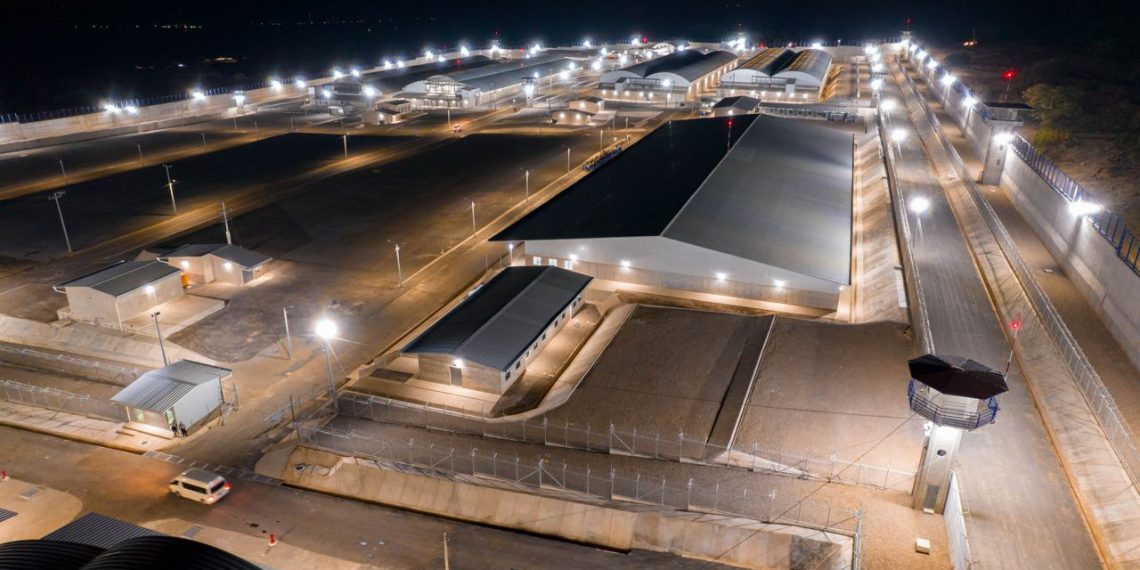Central America
Brazilian deputies visit Cecot and highlight security results

December 18 |
Brazilian federal deputy Eduardo Bolsonaro highlighted yesterday on social networks the security results obtained by the government of President Nayib Bukele. The Brazilian legislator was part of the delegation of seven parliamentarians who visited the country to see the Terrorism Confinement Center (Cecot) and all the security policies implemented in the last four years.
He also reiterated that President Bukele has a 90% approval rating from the population and that the security measures implemented with the Territorial Control Plan (PCT) and the exception regime have allowed El Salvador to accumulate more than 500 days without homicides during his administration, in which more than 75,000 criminals, mainly gang members, have also been arrested.
The implementation of security strategies, reforms to regulations so that criminals do not leave prisons, the alignment of powers and the dignification of the security forces are some of the aspects that Bolsonaro highlighted, so he reiterated that this has allowed President Bukele to achieve the transformation of El Salvador.
“What Nayib Bukele did is everything we proposed in terms of security in the Brazilian congress. The mentality is the same: arrested criminals do not commit crimes in society. With greater punishability, the economic theory of the criminal becomes more dangerous for him to commit a crime. Bukele managed to do this by electing a group of aligned parliamentarians and purging mainly the radical left in the elections,” Bolsonaro wrote in X.
The congressman stressed that, thanks to the exception regime, El Salvador went from being the most violent country in the world in 2015 to a benchmark in security and rivaling Switzerland for the number of homicides per 100,000 inhabitants.
“Today, if a police officer finds a notorious mafioso, he can arrest him for up to six months, the time the Public Prosecutor’s Office has to present the first evidence against the accused. The rule is that the accused responds to the arrested case (in Brazil it is the opposite). Between criminals and good people, today El Salvador cares about good citizens. That is why in Brazil there are criminals every day who have criminal records, who walk around the block and are arrested countless times; no longer in El Salvador,” he said.
President Bukele managed to decrease the criminal actions of gangs since he began his administration in 2019, and 2023 is about to close as the safest year in the history of El Salvador, an aspect that has paved the way for sectors such as the economy, tourism and education to develop and strengthen; to this effect the president considered important the dignification of law enforcement and has emphasized that none of the above would be possible without them.
Bolsonaro pointed out: “With more personnel, better salaries, with social security support, technology, support from the president and the population, as well as legal support, the police will fight the initial battle. Then comes social support: health, education, employment. Before, it made no sense to build schools in a gang-dominated area […]. Tourism also receives special attention as an economic engine.
Central America
Costa Rica Goes to the Polls as Voters Choose Continuity or Change

Costa Ricans head to the polls today to elect the president of the republic and 57 members of the Legislative Assembly for the 2026–2030 term. Voters must choose between continuing the political project of outgoing President Rodrigo Chaves by supporting the ruling right-wing candidate Laura Fernández, or opting for a change in direction proposed by the opposition.
Fernández, representing the Pueblo Soberano Party (PPS), leads opinion polls with close to 40% of voting intention, bolstered by the outgoing president’s approval rating, which exceeds 50%. Chaves is barred from seeking immediate re-election under Costa Rican law.
Trailing far behind is Álvaro Ramos of the National Liberation Party (PLN), with less than 10% support. He is followed by Claudia Dobles of the Citizen Agenda Coalition (CAC), Fabricio Alvarado of New Republic (NR), and Ariel Robles of the Broad Front (FA), each polling between 3% and 5%. Undecided voters, who account for more than 30% of the electorate, could determine the outcome of the presidential race or force a runoff.
In a statement, Costa Rica’s Supreme Electoral Tribunal (TSE) reaffirmed its commitment to transparent and secure elections. “As has been the case for more than 76 years of democratic life in our country, the Supreme Electoral Tribunal guarantees all Costa Ricans that the national elections to be held this Sunday, February 1, will meet the highest standards of security and absolute transparency, allowing us to continue enjoying electoral processes in peace and freedom,” the institution said.
Authorities reported that 53,251 party observers will take part in the electoral process. Of these, 12,472 belong to the Social Christian Unity Party, 11,524 to Pueblo Soberano, 10,451 to the PLN, and 4,141 to the Citizen Agenda Coalition, among others. In addition, six political parties have sworn in 7,520 members of polling station boardsdeployed nationwide.
Central America
U.S. and Guatemala Sign Trade Deal Granting Zero Tariffs to Most Exports

The United States signed a reciprocal trade agreement with Guatemala on Friday, under which 70.4% of Guatemalan exports will enter the U.S. market tariff-free.
Guatemalan President Bernardo Arévalo highlighted the importance of the agreement, stating that it creates a framework of cooperation, certainty, and new opportunities for producers, workers, and entrepreneurs in the country. His remarks were shared in a video published on his official social media channels.
In 2025, 30.3% of Guatemala’s total exports were destined for the United States, amounting to approximately $4.3 billion. As a result, the agreement is expected to directly benefit key sectors of the Guatemalan economy, including agribusiness, manufacturing, and the textile industry.
“Today we have taken another step toward consolidating a country that, when it moves forward united, generates confidence, attracts investment, and creates real development opportunities for all its people,” Arévalo added.
The agreement with Guatemala follows a similar trade deal signed by the United States with El Salvador on Thursday, which includes the elimination of a 10% tariff on Salvadoran imports.
Central America
Panama Supreme Court Strikes Down Panama Ports Concession as Unconstitutional

Panama’s Supreme Court of Justice has ruled unconstitutional the concession contract granted in 1997 to Panama Ports Company (PPC), a subsidiary of the Chinese conglomerate CK Hutchison, which operates two strategic ports along the interoceanic canal. The decision was announced on Thursday, January 29, 2026, following two lawsuits filed by the Comptroller General’s Office.
The ruling directly affects the management of the ports of Balboa, on the Pacific coast, and Cristóbal, on the Atlantic side, both of which have been operated by the company for nearly three decades. According to Panama’s Comptroller General, Anel Flores, an audit uncovered irregularities in the contract that resulted in more than $1.3 billion failing to enter state coffers.
“It is a predatory contract, abusive to the interests of the country,” Flores stated.
The Supreme Court determined that Law 5 of 1997, its subsequent amendments, and the automatic extension granted in 2021 are unconstitutional. The ruling noted that the contract renewal took place without adequate oversight and amid allegations of corruption, despite the Panamanian state holding only a 10% stake in the company.
-

 International5 days ago
International5 days agoU.S. Senate Rejects Budget, Bringing Government Closer to Shutdown Amid DHS Dispute
-

 Central America4 days ago
Central America4 days agoPanama Supreme Court Strikes Down Panama Ports Concession as Unconstitutional
-

 Central America4 days ago
Central America4 days agoU.S. and Guatemala Sign Trade Deal Granting Zero Tariffs to Most Exports
-

 International5 days ago
International5 days agoStorm Kristin Kills Five in Portugal, Leaves Nearly 500,000 Without Power
-

 International5 days ago
International5 days agoMan Arrested After Vehicle Crashes Into Jewish Institution in Brooklyn
-

 International5 days ago
International5 days agoTrump Says Putin Agreed to One-Week Halt in Attacks on Ukraine Amid Extreme Cold
-

 Central America2 days ago
Central America2 days agoCosta Rica Goes to the Polls as Voters Choose Continuity or Change
-

 International1 minute ago
International1 minute agoMexico Arrests Suspect in Shooting of Sinaloa Lawmakers










































































































